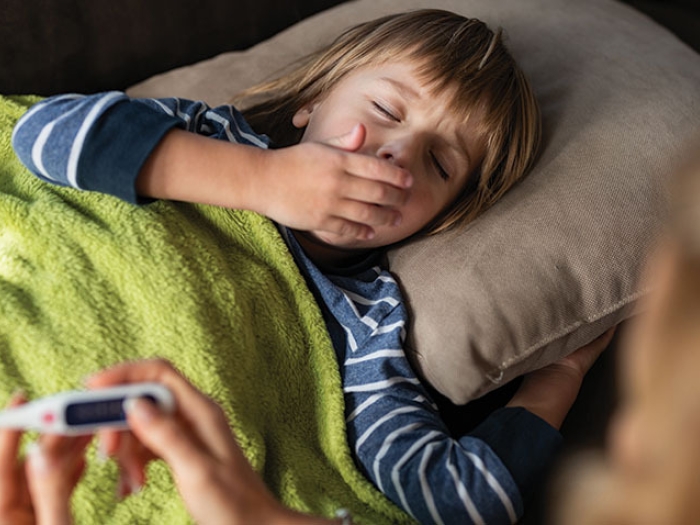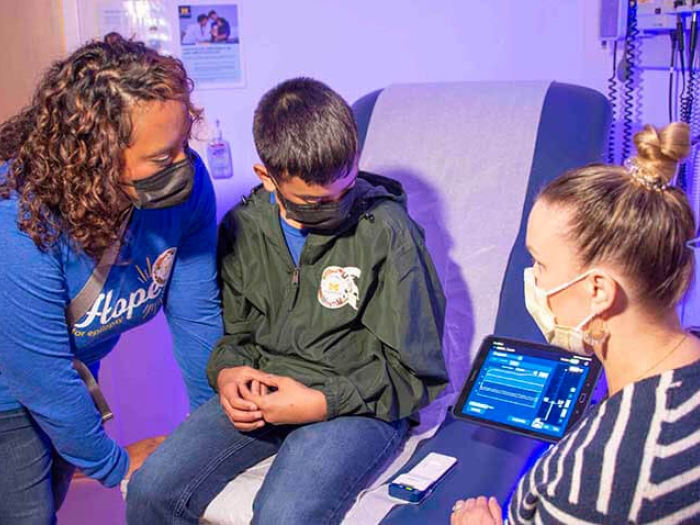New national poll finds that 1 in 6 parents would get a pet as a present for their child. A Mott pediatrician offers advice for parents considering adding a pet to their family.
5:00 AM
Author |

A new puppy or kitten may be at the top of some children's wish lists for holidays or birthdays, but parents should do their research before saying yes, experts warn.
One in six parents say they would get a pet as a present for their child, according to the C.S. Mott Children's Hospital National Poll on Children's Health at the University of Michigan. While 42% say no to animals as gifts, another 40% say they might consider it.
Mott pediatrician Hannah King, M.D., says it can be tempting for parents to get pulled into the moment and agree to a new pet, but they should consider all of the lifestyle adjustments first.
"A pet can be a wonderful part of childhood, teach important life skills and bring families great joy and companionship," says King, who practices at Michigan Medicine's Saline Health Center. "But parents need to weigh the decision carefully to make sure a new pet is the right decision for their family."
Before heading to a shelter or pet store, King recommends parents answer these six questions:
1. Has the child shown genuine interest?
If the first time you heard your child say he wanted a turtle was when Santa asked him what he wanted for Christmas, it's likely a fleeting wish. If a toddler or child under the age of 4 expresses interest in a pet, King advises parents to wait and see if it sticks with time. "It's very common for kids to suddenly want a pet because they see it in a book or movie. For young children especially, it could just be a phase, so you want to make sure they show sustained interest," she says. Parents may consider the idea more seriously for children between the ages of 5 and 10 who talk about a pet for more than a few weeks.
2. What are reasonable expectations for pet care contributions?
If parents are expecting their child to take on some of the new pet responsibilities, they need to make this clear in advance. But they should also have reasonable expectations depending on their child's age and maturity, King says. A toddler may be able to pick up pet toys or fill a water bowl while kids between ages 5 and 12 may be able to help with feeding and grooming. Children 12 and older may be ready to take the animal on walks.
A child's commitment to other daily tasks should also be considered, King says. Do they brush their teeth twice a day without being reminded, for example? If it's their job to set the table for dinner, do they do it every night – and if not, is a gentle reminder enough for them to follow through? "If it's a constant fight to get your child to do a chore, it's likely going to be similar when you are trying to get them to walk the dog in the rain or when they're in the middle of a video game," she says.
MORE FROM MICHIGAN: Sign up for our weekly newsletter
3. Are you willing to pick up the slack?
King says there are steps parents can take to set their children up for pet care success. She suggests arranging for a test run with a friend or neighbor's pet to see how children handle responsibilities and also how they interact with the animal. Some shelters also offer sleepover weekends with dogs.
Visual reminders on the fridge about what the animal needs every day may also help kids get used to new daily habits. Still, parents need to be prepared for children tiring of the tasks when the "newness fades," King says.
"Regardless of a child's age, parents must understand that this is a family pet and ultimately the pet is their responsibility," she says.

Parents should also consider the financial impact on their family, King notes, including costs of food, grooming, boarding, vaccines and other veterinarian care. "Hassle" and costs were among top reasons parents surveyed in the Mott Poll listed for not getting a pet.
4. What is the right pet for your family?
Among questions to ask when choosing a pet: How long will your pet usually be home alone? Do you travel often? How will this animal impact your home environment?
A goldfish, which needs to be fed every few days and have its water changed periodically, is a good "starter pet," King says. Guinea pigs and birds that need more daily care are more middle of the road when it comes to maintenance while cats and dogs require a bigger commitment.
When it comes to dogs, families should also research breeds and temperaments. A golden retriever is known to be more calm and gentle, for example, while smaller breeds may be more prone to biting. Certain dogs may also provide relief for anxious children or help hyper children release some energy.
"Families just need to be honest with themselves and ask 'how much space is in our home? How energetic are we? Can we commit to taking care of this animal for years to come? What are the benefits to our family?'" King says. "If they do their research, most families can find a good fit for their home."
LISTEN UP: Add the Michigan Medicine News Break to your Alexa-enabled device, or subscribe to our daily updates on iTunes, Google Play and Stitcher.
5. Are there safety issues to consider?
Children ages 4 and under should always be monitored with pets, King says. She recommends waiting until a child is at least 5 to get a new cat or dog because older children have more self-control and may better understand rules like not snatching away toys or interrupting animals while they eat.
"Even the most well-trained dog might bite if you pull on its tail," King says.
Families should also look into whether their child might have allergies, which may not be obvious at a young age if the child isn't usually around animals. Allergies are among reasons animals get returned to shelters, King says.
6. Is this an impulsive decision?
Parents may fantasize about surprising their child with a new puppy Christmas morning, but pets shouldn't be a spur-of-the-moment decision, King says. Instead, she recommends parents gift pet food or a cage if they want to surprise their children. But then they should follow that up with conversations about preparing for an animal. She also recommends children meet a new potential pet before bringing it home to see how they react and to make sure it's a match.
"We hear about animals getting returned to shelters after the reality of the lifestyle change sets in or because the pet wasn't the right fit. That can be a really sad situation for both the family and the animal," King says.
"A pet can be a lot of fun and a wonderful addition for a family as long as parents have done their research and are prepared for the long-term commitment."

Explore a variety of health care news & stories by visiting the Health Lab home page for more articles.

Department of Communication at Michigan Medicine
Want top health & research news weekly? Sign up for Health Lab’s newsletters today!





